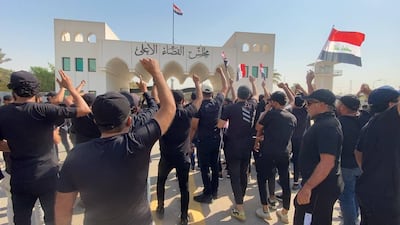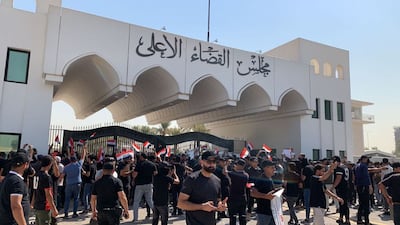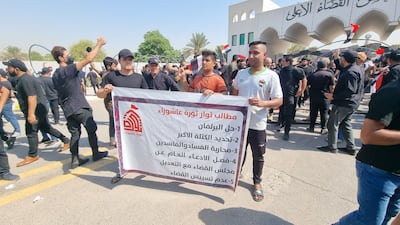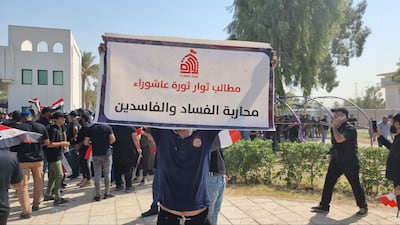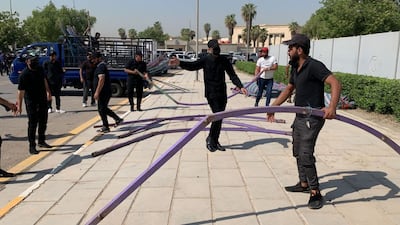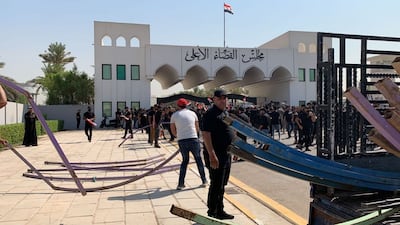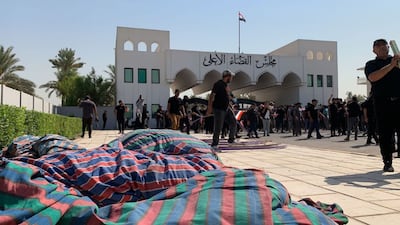Iraq's powerful nationalist Shiite cleric Moqtada Al Sadr has said existing political parties, including his own, would not be able to partake in new elections which have been proposed as a way to resolve a months-long political crisis.
Iraq has been gripped by political deadlock since October’s national elections, despite Mr Al Sadr's bloc winning 73 seats — the plurality in the 329-member assembly.
“All parties and figures who have been part of the political process from the American occupation in 2003 until now no longer participate", Mr Al Sadr said in a Twitter post on Saturday, in reference to proposed elections.
"That includes the Sadrist movement."
Mr Al Sadr's rival bloc, the Co-ordination Framework ― a coalition of mainly Iran-backed parties that includes the cleric's arch rival, former prime minister Nouri Al Maliki, released a statement on Sunday rejecting his proposal.
Co-ordination Framework spokesman Ayed Al Hilali said his coalition would not be blocked from politics and warned such a move would only worsen "conflict."
Iraq has witnessed relative stability since the Islamic State group was largely defeated in the country in 2017. But the latest political stand-off has raised fears of a new war, this time between heavily armed militia groups loyal to Mr Al Sadr, and those linked to the Co-ordination Framework, some of whom have been equipped and trained by Iran.
Mr Al Sadr pulled his MPs from Parliament in June, protesting against a series of legal challenges to his attempts to form a government.
Under Iraq’s constitution, a new president must be elected by Parliament following national elections. The president then nominates the largest bloc — which would have been Mr Al Sadr’s. The largest bloc then chooses a prime minister, who forms a Cabinet.
But the Co-ordination Framework blocked this process.
Legal challenges, boycotts of parliamentary votes and — Mr Al Sadr alleges — assassination attempts on his Sunni and Kurdish allies, have all been launched by the Co-ordination Framework to derail government formation.
Analysts say militias linked to the Co-ordination Framework have been responsible for assassination attempts on Mr Al Sadr’s former political allies in the Kurdish Democratic Party and leading Sunni party Taqqadum.
In January, Taqqadum’s leader and Parliament speaker Mohammed Halbousi was attacked in a rocket attack on his home in Anbar and a hand grenade attack on his party’s office in Baghdad.
After asking his MPs to resign, Mr Al Sadr’s supporters have since occupied the area around Parliament in the country’s seat of government, the Green Zone.
Mr Al Sadr has been calling for Parliament to be dissolved and for new elections. However, on Saturday, the cleric said doing so was not "so important," stressing that his main demand was for the main post-2003 parties to abstain from future elections.
This would leave only a handful of small new parties, some of which are linked to a national protest movement that began in October 2019, to compete for seats.
"I am ready to sign an agreement to this effect within 72 hours," he said, warning that without such a move, "there would no longer be any more room for reforms." He did not indicate who he expected would lead a future government.
On Tuesday, Mr Al Sadr’s supporters also pitched tents outside the judicial body's headquarters in Baghdad for several hours.
The Co-ordination Framework want a new head of government to be appointed before any new polls are held.
Caretaker Prime Minister Mustafa Al Kadhimi earlier this month convened crisis talks with party leaders, but they were boycotted by the Sadrists.
Mr Al Kadhimi issued a warning on Saturday that the political crisis in the country was threatening security achievements made in past years.
“This political crisis threatens the security achievements and the nation’s stability,” Mr Kadhimi said, in a speech marking the Islamic Day of Combating Violence against Women in Baghdad.
“Now, the solution is for all political parties to make concessions for the interests of Iraq and Iraqis."
Last week, Mr Al Kadhimi called for a meeting of senior political leaders and party representatives to find a solution. He gave a warning that if “fighting erupts, the shootings will not stop and will remain for years".
